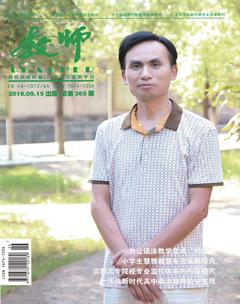Politeness Strategies of Teacher Talk in College English Class
樊海怡
Ⅰ.Functions of teacher talk
Ellis(1984)defines teacher talk as teachers make adjustments to both language form and language function in order to facilitate communication. These adjustments are referred to as“teacher talk”.Teacher talk has at least three functions to perform in the college English class. Firstly,it can be used in teaching the lesson itself,such as,giving examples,introducing a text,and asking questions,etc. Secondly,it can be used to socialize with students. English is used for greeting,show concern,apologizing ,and saying farewell belong here. For example, instead of going straight to the textbook at the beginning of a lesson,the teacher can spend a few minutes chatting to the class about topics of general interest. Chatting in English with the students creates an opportunity for real language practice,and creates an English language atmosphere in the class. Moreover,it establishes rapport with the students and helps them to feel relaxed and ready to learn. Finally,it can be used to organize the lesson. English is used for starting or stopping an activity and that for getting the students to do or not to do certain things belong here. This“organizing language”consists of simple commands and instructions, which are repeated lesson after lesson. So if the teacher says them in English, students will quickly know what they mean. However,teachers do not only need to give simple commands and instructions to the class,but to use more complex language,for example when explaining a new word or a grammar point,or explaining how an activity works.
Ⅱ.Leechs Politeness Principle
Leech(1983)formulates his Politeness Principle in the form of the maxims:tact maxim,generosity maxim, approbation maxim,modesty maxim, agreement maxim and sympathy maxim. These maxims of the politeness principle are generally observed in communication in any language community.The speaker often offers more benefit to the hearer and leaves more cost to himself,with the purpose that both of the two sides will feel respected,and get good impression from the other. It is clear that the Politeness Principle is a principle,according to which the expression of an impolite belief or statement is reduced to a minimum degree in the context,with all the other conditions being the same. In classroom conversation, all types of teacher talk observe the Politeness Principle.Teacher achieves the end to communicate with the students successfully and harmoniously.Some psychological obstacles existing in foreign language learners can be removed,and the studentsimagination and logical thinking can be evoked,and naturally their communicative competence can be developed validly.
Ⅲ.Politeness Strategies Used in Teacher Talk
Politeness is always by its very nature a question of judgment and assessment. It cannot be understood simply as a property of utterance, or even as a set of choices made solely by individuals, but rather as a set of practices or strategies which communities of practice develop, affirm, and contest, and which individuals within these communities engage with in order to come to an assessment of their own and othersbehavior and position within the group.
1.Direct Strategy
Syntactically,the direct strategy is marked by the imperatives or other straightforwardly dominant speech act utterances such as performatives, obligation statements and want statements.
At first,in teacher talk,imperatives mostly take such patterns when teacher ask students to finish some classroom tasks. Such as,“Just say something about your opinion.”“Read the words yourselves,please.”and“Stop here,please.”etc.In addition,when new information is being presented,the following simple patterns will commonly come into use.Such as,“Ellen, please?”“First about the author.”“Louder,please.”
Moreover,“Lets + V”is often used. Such as,“Lets get down to our business.”“Lets go on.”
Finally,the want statements straight forwardly express the speech act to be performed in teacher talk. Such as, “Id like you to say something about this topic.”“I want you to think it over.” “I suggest you talk to your friends about this.”Sometimes,interrogatives in the following forms also enable the teachers to launch some requests directly. For example,“Mike,are you listening to us?”(to remind Mike to concentrate on the lesson)“Why dont you turn to the next paragraph to find the very word?” (Ask to find the particular word)
2.Conventionally Used Indirect Strategy
Conventionally used indirect strategy in question is usually assisted by some modifications conventionally used to perform a certain speech act. Before the speech act is performed, the conditions for its performance are taken into consideration through the interrogative of the speaker,the teacher,in the classroom. These conventionally used modifications consist of suggesting formulae utterance and asking about the preparatory conditions.
The interrogatives of the two functions are classified. In first place, interrogatives with and without modal verbs can be found in teacher talk. Such as, “Will you follow me please?”“Can you share your opinion with us?”“Shall we stop here?”and “Who would like to comment on this?”In second place,the utterances of interrogatives without modal verbs take the patterns such as“what about...” (suggesting formulae utterances) “Are you willing to...”or“Are you ready...”(Inquiring possibility). Such as,“What about you?”and“Are you ready?”
3.Non-conventionally Used Indirect Strategy
When non-conventionally used indirect strategy is being used,the hearers(the students)have to turn to the context and the classroom register to interpret the meaning and the implication of the speakers(the teachers) illocutionary force. Such strategy is normally marked by some hints.The utterance patterns mostly take simple statements or statement questions. Such as,“You are using a rather big word here.”(a suitable word is hinted to be replaced)“I asked only one student.” (Students are hinted to be quiet)“Mr. Stewart doesnt like to do that?”(Tense error is hinted)
References:
[1]Ellis,R.Classroom Second language development–A study of classroom interaction and language acquisition[M].Oxford: Pergamon Press,1984.
[2]Leech,G.N.Principles of Pragmatics[M].London:Longman Group Ltd,1983.

